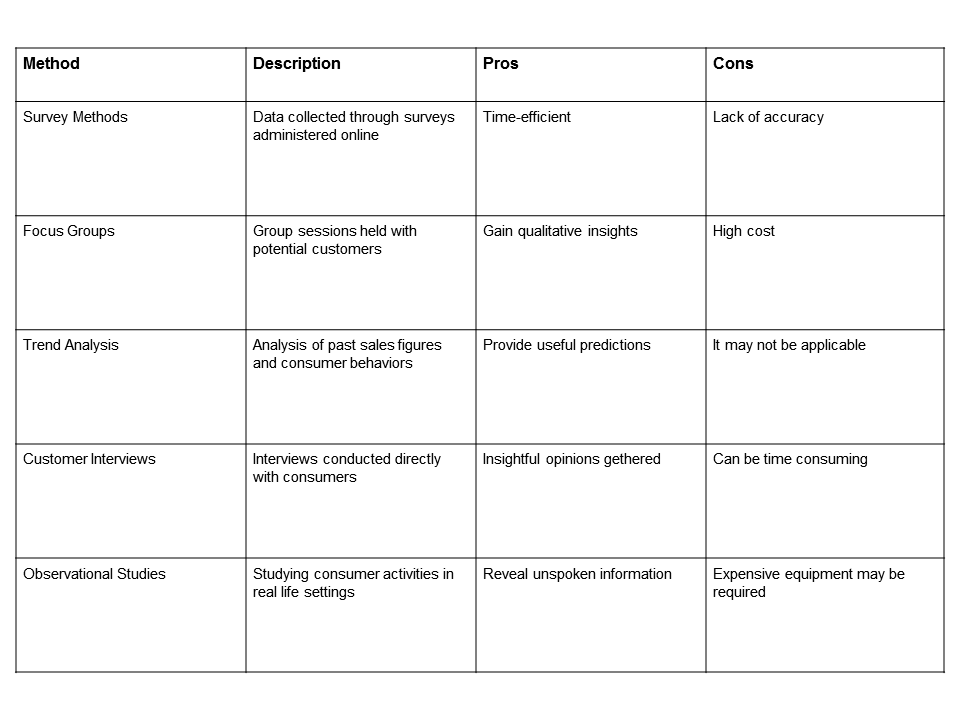Market research is an essential tool businesses can use to gain insight into their target markets, competition, and overall industry trends. This data helps inform business decisions such as strategic planning, product development, pricing strategies, advertising campaigns, and more. With proper market analysis and insights, entrepreneurs can better position themselves for success by capitalizing on opportunities within their competitive landscape.
In this article, we’ll explore how investing in strong marketing research process can benefit your startup’s growth trajectory. We will look at ways to collect relevant data from both primary and secondary sources that are cost-effective yet comprehensive enough to provide actionable insights.
Definition Of Marketing Research
Market research is the key to unlocking success for any startup. It’s a process of uncovering insights about your target market, customers, and competitors that can help you make smarter decisions in business. The definition of marketing research is simple: it’s gathering data from the marketplace to inform better decision-making.
This means researching markets, conducting surveys and interviews with potential customers, analyzing customer behavior and preferences, identifying trends, understanding competitor activities, tracking industry changes, and more – all to create a detailed picture of what’s happening in your space.
The role of market research goes far beyond simply collecting information – its purpose is to provide actionable intelligence on which you can base critical strategies and plans that will shape the future of your business. Market research is essentially “intelligence-led decision making”; armed with facts rather than guesswork or intuition, you can develop targeted campaigns that are proven effective before investing time or money into them.
As such, market research enables startups to maximize ROI while minimizing risk. Through comprehensive analysis of existing data sources combined with primary source collection methods like survey results or focus groups discussion summaries, businesses have access to an invaluable resource they can use to chart their course ahead confidently. By leveraging this powerful toolkit at every stage of growth, they stand a much better chance of achieving their goals faster and more successfully than relying solely on gut instinct alone.
Benefits Of Conducting Market Research
Now that the definition of marketing research has been established, it is time to understand the benefits and advantages of conducting market research. Companies that take the time to conduct market research can use the data obtained from their efforts to inform business decisions, gain valuable insights into consumer trends, identify target audiences and analyze competitor information. Ultimately, this helps businesses grow by leveraging key insights derived from market research activities. Here are some specific benefits:
Gaining Insight Into Business Growth Opportunities
- Collecting Data Through Surveys & Questionnaires
- Using Focus Groups To Identify Consumer Trends
- Analyzing Existing Market Research Reports For Industry Insights
Identifying Target Audiences
- Utilizing Demographic Profiles To Reach Specific Markets
- Conducting A/B Testing To Understand Preferred Messaging Strategies
- Examining Customer Feedback & Purchasing Habits To Refine Offers & Promotions
Competitive Analysis Insights
- Monitoring Competitors’ Pricing Strategies & Product Offerings
- Gauging Online Presence To Increase Visibility In The Digital Space
- Tracking Social Media Engagement Metrics For Brand Awareness Efforts
These tangible benefits of launching a market research project can help startups make informed decisions about how best to create value for their customers to achieve success. It is also important for companies to consider the resources available when budgeting for such projects, including internal personnel costs and any external services needed. Considering these deliberations, it becomes clear why investing in marketing research is essential for startup growth and longevity.
From gaining insight into business opportunities to identifying target audiences and competitive analysis insights, there are numerous ways in which a well-thought-out market research strategy can positively impact a startup’s development trajectory. By understanding these potential outcomes, companies can confidently move forward with planning their market research initiatives – ultimately leading them closer to achieving their goals.
Types Of Market Research Techniques
Marketing research is essential for startups to gain valuable insights into customer behavior and preferences. It helps entrepreneurs make informed decisions, increase their competitive advantages, and maximize profits. A startup can identify trends and discover market opportunities through market research techniques.
To illustrate this concept, consider the analogy of a chef attempting to create an exquisite dish without prior knowledge or experience of what ingredients are needed to succeed. With reliable marketing research data, he would know where to start or how to create something delectable. The same holds for entrepreneurs; it could be disastrous if they don’t understand key stakeholders’ needs and wants before launching their product or service into the market.
The following table outlines some popular types of market research that startups should take advantage of when conducting primary research:

By leveraging these methods for market research, startups can accurately assess customer perceptions and develop strategies tailored to meet their goals. Additionally, by understanding industry trends and analyzing competitor behavior, entrepreneurs can adjust their business models accordingly to stay ahead. Gaining such insights will undoubtedly pave the way toward a successful venture launch.
How To Interpret The Data Collected

Interpreting the data collected from your marketing research is crucial in gaining actionable insights. When analyzing data, it’s important to use specific interpretation techniques to identify patterns and trends among information flows. Data analysis should help you discover relationships between different variables or highlight areas of opportunity for further exploration.
1. The first technique used during the data interpretation is descriptive analytics, which involves organizing and summarizing the raw data into meaningful metrics. This provides an overall perspective on how well certain strategies are working or where there may be potential issues with performance. For example, suppose sales figures show a sudden drop-off after a particular campaign launch date. In that case, this could indicate something wrong with the promotional materials or messaging used then.
2. Another useful method for interpreting collected data is predictive analytics. Predictive analytics involves extracting valuable insight from existing datasets using statistical models and algorithms to identify patterns and correlations between factors like customer demographics and buying behavior. With these tools, businesses can more accurately forecast future trends based on their current market position and better understand their target audience’s needs and preferences.
3. Data interpretation isn’t just about crunching numbers; it also requires creativity and critical thinking skills when concluding the results gathered. By combining qualitative and quantitative methods such as interviews and surveys alongside traditional analytical approaches, marketers can get a better handle on how best to optimize their campaigns for maximum success. From here, they can develop effective strategies for using their findings to drive growth within their organization.
Strategies For Using Your Findings
Having compiled your research data and interpreted the findings, you can now put those results to work. Marketing strategies must be based on research-driven conclusions for startups to be successful. To maximize the potential of your research results, there are several strategies to consider when developing a plan for using them.
- The first step involves analyzing your target audience concerning their interests and needs. Your research should provide insights into who they are, what type of products or services they’re interested in, and how much money they’re willing to spend. This allows you to craft marketing messages tailored specifically for them, leading to better engagement rates than generic messaging.
- Next, an effective strategy is to use your data analysis techniques during product development cycles to create innovative solutions that appeal directly to customer preferences. Researching competitive forces within the marketplace can also help you identify opportunities where you may have an advantage over competitors and develop unique selling points that customers find attractive. Doing so provides valuable insight into current market trends and helps inform decisions related to pricing structures, promotional tactics, branding efforts, and more.
- Finally, it’s important to understand why customers behave the way they do and how best practices from other industries might be implemented in yours. By exploring new ideas and testing different approaches, startups can better understand their target audiences and tailor their offerings accordingly, leading them down the path toward success.
Conclusion
Market research is essential for helping startups succeed. By understanding the needs and preferences of their target audience, businesses can make informed decisions that will increase their chances of success. Companies can gather data to identify customer trends and behavior patterns through various techniques such as surveys, interviews, and focus groups.
The marketing research process is essential for startups to ensure they make informed decisions that will positively impact their growth. By following a structured approach, startups can collect and analyze relevant data, gain insights into their target audience, and develop effective marketing strategies. At StartupNV, we understand the importance of market research for startups and offer resources and support to help entrepreneurs succeed.
Don’t hesitate to contact us and take the first step toward achieving your business goals!



